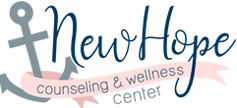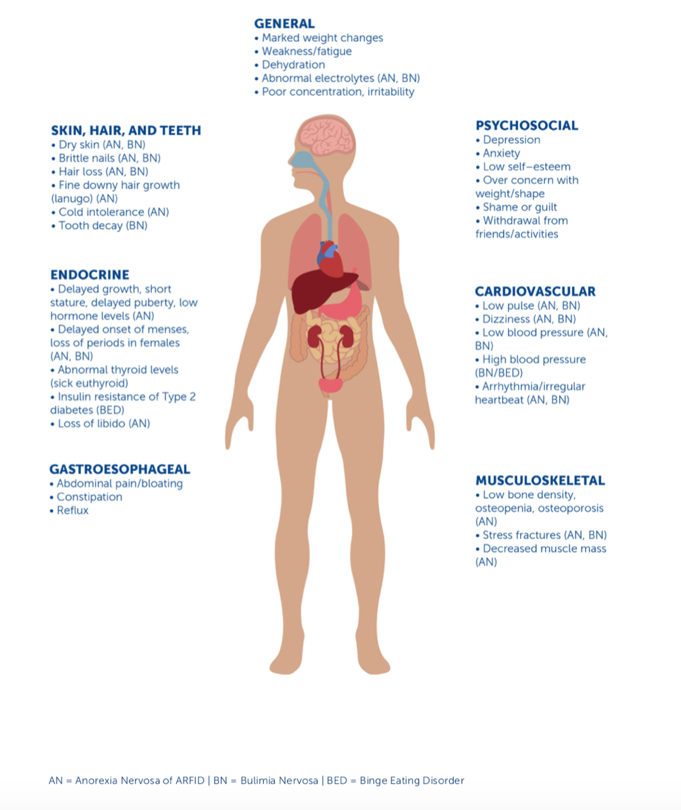Eating Disorders 101: What you need to know
Summary
Eating disorders are complex and can be difficult to understand and even diagnose. There are many common myths surrounding eating disorders creating more difficulty with individuals receiving the life-saving treatment they need. While treatable, eating disorders are serious and life-threatening and can cause long-term consequences if appropriate treatment is not received. More so, eating disorders have the highest mortality rate of all mental illness. Additionally, they commonly occur with other conditions such as anxiety, depression, substance use, and other coexisting mental illness. Eating disorders affect millions of people around the world and do not discriminate between gender, race, age, socioeconomic status, or ethnic background. Although more common to develop during adolescence, an eating disorder may appear during adulthood or later in life.
What Causes an Eating Disorder?
The exact cause of eating disorders is unknown; however, it is believed to be a combination of genetic, biological, and environmental factors.
Biological Factors:
- Genetics: Having a relative with an eating disorder increases the chance of developing and eating disorder
- Diet- Caloric Restriction and nutritional deficiencies
- Hormone function: thyroid abnormalities, endocrine, and pituitary function
Environment
- Participating in activities that focus on weight/shape/appearance
- Sports, acting, modeling, etc
- Professions that focus on appearance
- Family dynamics
- Trauma
- Cultural and societal pressure to look a certain way
- Life transitions: moving, school, work, marriage, starting a family, divorce, etc.
Physiological
- Negative body image
- Negative self esteem
Eating Disorders
The most common eating disorders are anorexia nervosa (AN), bulimia nervosa (BN), and binge eating disorder (BED). An eating disorder is associated with irregular eating patterns causing distress and possibly concern about weight, shape, and/or size.
Anorexia Nervosa
An individual with Anorexia Nervosa has an intense fear of gaining weight, refuses to maintain a weight that is appropriate for his/her body, and has distorted views related to body image. People with AN will restrict their intake, limit or eliminate foods or food groups and are very scared of gaining weight and see themselves as being overweight.
Bulimia Nervosa
Bulimia Nervosa involves repeated cycles of binging and purging. The individual will often eat an unusually large amount of food in a very short amount of time, followed by a purging episode to counteract the binge. Purging may include activities such as vomiting, taking laxatives, enemas, or diuretics, or excessive exercise. These individuals are also trying to avoid gaining weight and tend to have a body mass index that falls within the normal, sometimes overweight, range. Individuals with BN are usually very secretive about their habits and go to extreme lengths to avoid being discovered.
Binge Eating Disorder
Binge Eating Disorder also involves eating unusually large amounts of food in short periods of time, however the episodes are not followed by purging. People with BED feel out of control during these eating episodes and often feel extreme guilt and shame afterwards. BED is the most common of these three eating disorders, and it is a common feature of emotional eating as well. Despite the binge episodes, many people with this disorder are not overweight.
Signs of an Eating Disorder
You cannot tell whether a person is struggling with an eating disorder just by looking at him or her, but there are warning signs to look for if you’re concerned.
- Chronic dieting
- Obsession with counting calories or nutrient
- Frequent weight fluctuations
- Avoiding eating in front of others
- Engaging in eating rituals: cutting food into tiny pieces, obsessively reading nutrition labels, or
- Weighing self frequently or body checking in the mirror
- Sudden isolation or acting withdrawn
- Avoiding social situations involving food
Medical Complications
An individual does not have to be under-weight to be struggling, and the health consequences of an eating disorder can be fatal. Some are specific to certain types of eating disorders, but the diagram below gives an overview of the effects an eating disorder can have on somebody’s body.
Treatment
There is hope for those that struggle with eating disorders, and recovery is absolutely possible. The best practice for treatment requires a comprehensive multidisciplinary team. This usually consists of doctors, therapists, and dietitians. Family treatment is often an important aspect of care as well. Medication is sometimes needed to treat underlying mood disorders, anxiety, or depression. Treatment can occur in outpatient settings or inpatient, residential, partial hospitalization, or intensive outpatient. The level of care depends on the severity of the illness. If you suspect that you or someone you love has an eating disorder, reach out for support today. The National Eating Disorder Association has great resources to help you navigate the road to recovery. Additionally, you can contact me at amy@therapyemail.com or on my website links for additional information about my services, either virtually or local in Columbia, SC.
Take Home Message
While serious conditions, eating disorders are completely treatable and full recovery is possible. They are complex biopsychosocial illnesses and not strictly about food and/or weight. For the individual suffering with an eating disorder, it is providing a sense of control, relief, and respite from something that is difficult to manage. We need to take the focus off weight and on ways to best support those we care about in order to promote a weight-neutral, body-positive culture.
Amy Helms, LMSW, MS, RD, LD, CLT
Hi! I’m Amy, the founder of New Hope Counseling and Wellness Center, LLC. I’m an experienced therapist and dietitian and I believe in the power of human connection and self-compassion to foster growth and powerful transformation. I have dedicated my career to counseling, supervising, and teaching in the field of nutrition, body image, intuitive eating, eating disorders, and food allergies. Please reach out if I can support you on your journey.










